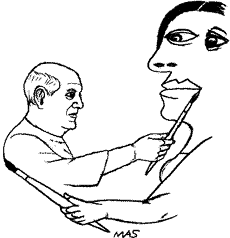Reviewers reviewed.
Movie

Evita (Hollywood Pictures). After months of tie-ins, fashion reviews, books, and all-out hype, the reviews are in, and critics still can't tell if Evita's a movie. The New Yorker's Anthony Lane calls it "more of a film version of a stage show"; the New York Times' Janet Maslin calls it Madonna's "most colossal music video."Evita has three main problems, according to critics: 1) It lacks humanity--"This is a weird, inert, terribly distant piece of moviemaking," says New York's David Denby. 2) It lacks a point. 3) It has awful politics--it's "a kind of fascist pseudo-opera" (Denby). "It's The Triumph of Her [i.e., Madonna's] Will" (the Wall Street Journal's Joe Morgenstern). Madonna fares slightly better--but only slightly. "At a certain point you realize that Madonna hasn't a single musical moment that goes beyond artful amplified competence" (Morgenstern). (The official Evita site has the works: clips, stills, audio, Madonna on "The Role of a Lifetime," etc. Also check out Louis Menand's review of the film in Slate.)
Movie
Portrait of a Lady (Gramercy). Male critics cringe at Jane Campion's Portrait of a Lady; female critics call it her masterwork. "Jane Campion has done something of which I never thought her capable," writes The NewYorker's Lane. "[S]he has made a boring film." The New Republic's Stanley Kauffmann deems the film a feminist morality play. But the New York Times' Maslin calls the movie "daring, abstract," and filled with "imagination and surprise"; the Village Voice's Amy Taubin declares, "As Raging Bull is to Martin Scorsese, Portrait of a Lady is to Jane Campion." (See the film's official Web site.)

Book
A Life of Picasso, Volume 2: 1907-1917, by John Richardson, with the collaboration of Marilyn McCully (Random House). Almost every critic has heaped praise on the second volume of John Richardson's biography of Pablo Picasso, which covers the painter's cubist period. "Magisterial," declares Frances Spalding in the Times of London. It's among the "grand English-language biographies of our time," says poet Richard Howard in the New York Times Book Review. And art historian Dore Ashton describes it as definitive. TheNew Yorker's Adam Gopnik is the notable exception. He accuses Richardson both of crudeness (he sees sex as the meaning of every painting) and of whitewashing his subject (he downplays Picasso's misogyny): "Without the Continuing Saga of Pablo's Greatness, there's not much there, except some wonderful drawings and a lot of irritability." Random House plugs Richardson's book at its site.
Musical
Once Upon a Mattress (The Broadhurst Theatre on Broadway). The revival of the 1959 musical is being hailed as one of the most monumental Broadway flops in years. "Misbegotten," says Ben Brantley of the New York Times; "Dead on delivery," agrees Clive Barnes of the New York Post. Based on Hans Christian Andersen's story "The Princess and the Pea," the production features Sarah Jessica Parker in the role that made Carol Burnett a star. Donald Lyons of the Wall Street Journal says that "Parker lacks the whimsy and stupid Lucille Ball-like humor" to pull it off. The critics add that the musical itself, which had a plot that was forgettable--and incoherent--was pretty lame to start with.
Movie
Hamlet (Columbia). Kenneth Branagh: masterful Shakespearean or insufferable egomaniac? Reviews of his four-hour Hamlet, with its unlikely cast (Billy Crystal, Robin Williams, Charlton Heston), don't resolve the question. In the pro-Branagh camp lie the New York Times' Maslin and the Los Angeles Times' Kevin Thomas--who actually likes Branagh's Hollywood touches, such as the "to be or not to be" soliloquy performed before a two-way mirror. In the other camp is John Anderson of Newsday, who derides Branagh's "antic energy," and New York's Denby, who calls the film "overscaled, huge, and hideously exposed." He says that "[e]ven the soliloquies come off as an extrovert's meditations--as bouts of self-loathing, such as Leonard Bernstein might have had after a bad concert." (Check out the Hamlet Web site, which has everything you ever cared to know about Branagh and about interactive Hamlet games.)
Book
The Odyssey, by Homer, translated by Robert Fagles (Viking). The new translation of Homer's The Odyssey has whipped up so much fervor that Paul Gray in Time has proclaimed the existence of the "Fagles phenomenon." Robert Fagles, a Princeton classicist, translated The Iliad in 1990 and sold an astonishing 140,000 paperback copies of his version. Anticipating similar sales, Viking shipped 27,000 copies of The Odyssey to bookstores and 10,000 copies of a tape of the actor Ian McKellen reading it. Gray attributes Fagles' popularity to his simple, straightforward language. Other reviewers place Fagles' work in the same league as Fitzgerald's and Lattimore's classic translations. In the New York Times Book Review, Richard Jenkyns declares Fagles' language "timeless."
Updates:
The backlash against The People vs. Larry Flynt has begun. Early reviews offered high praise for Milos Forman's loving portrait of the pornography magnate, but recent articles in the New York Times and the New Republic point out that the film's hero, the publisher of Hustler, actually was a racist, misogynistic scum bag. ... Louis Menand, writing in the New York Review of Books, calls Michael Crichton's techno-thriller Airframe "commercial culture's revenge on itself."... More plaudits for Margaret Atwood's Victorian thriller Alias Grace: In the New York Times Book Review, Francine Prose compares the book to a 19th-century novel, because of its "spooky plot twists" and "engrossing narrative." The Washington Post's Marie Arana-Ward goes one better, claiming that Atwood at times rivals Flaubert.
Recent "Summary Judgment" columns:
Dec. 18: The People vs. Larry Flynt (Columbia Pictures); Marvin's Room (Miramax); The New Fowler's Modern English Usage, edited by R.W. Burchfield, (Oxford University Press); A Reporter's Life, by Walter Cronkite (Knopf); Alias Grace, by Margaret Atwood (Nan A. Talese/Doubleday); Whistle Down the Wind (National Theatre, Washington, D.C.).
Dec. 11: Jerry Maguire (TriStar); Evita (Hollywood Pictures); Santa Evita, by Tomas Eloy Martinez (Knopf); Eva Perón, by Alicia Dujovne Ortíz (St. Martin's); Eva Perón's autobiography, In My Own Words (New Press); Airframe, by Michael Crichton (Knopf); The Battle for Christmas, by Stephen Nissenbaum (Knopf); Bastard Out of Carolina (Showtime); Benjamin Britten operas in New York.
Dec. 4: 101 Dalmatians (Disney); Everyone Says I Love You (Miramax); Bertrand Russell: The Spirit of Solitude1872-1921, by Ray Monk (Free Press); Drown, by Junot Díaz (Riverhead); Emancipation, by the Artist Formerly Known As Prince (NPG).
Nov. 26: The Crucible (20th Century Fox); Duchamp: A Biography, by Calvin Tomkins (Henry Holt); Indian Killer, by Sherman Alexie (Atlantic Monthly Press); The Car that Could: The Inside Story of GM's Revolutionary ElectricVehicle, by Michael Shnayerson (Random House); The Larry Sanders Show (HBO); The High Life (HBO); "Max Beckmann in Exile" (Guggenheim Museum SoHo, New York City).
--Compiled by Franklin Foer and the editors of Slate.
